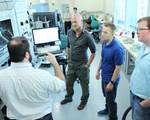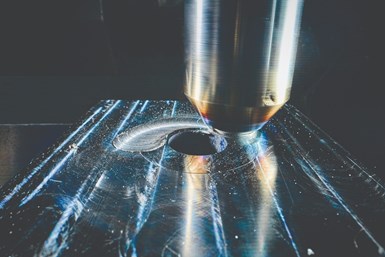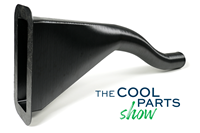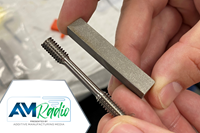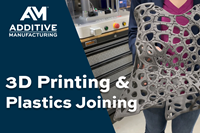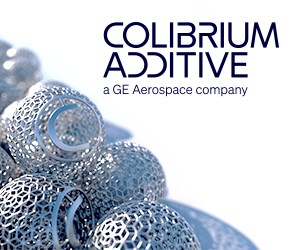Mazak MegaStir Will Be Exclusive Tooling Supplier for Meld Solid Deposition Technology
Mazak MegaStir will provide its hard metal expertise along with tooling specifically developed for the Meld process that also incorporates the use of friction as part of its solid deposition process.
A rotating FSW tool plunges into the workpiece, dwells momentarily to enable rotation, friction and pressure to create a plasticized material pool, then traverses the workpiece to create the weld. Photo Credit: Mazak
Mazak MegaStir has signed an agreement making it the exclusive tooling supplier for Meld Manufacturing’s solid deposition technology. As a pioneer in friction stir welding (FSW) technology, Mazak MegaStir will provide its hard metal expertise along with tooling specifically developed for the Meld process that also incorporates the use of friction as part of its solid deposition process.
Mazak MegaStir has the ability to provide the complex tooling with the high-strength capability necessary to commercialize Meld’s solid deposition technology, according to Dale Fleck, general manager of Mazak MegaStir. The tooling is made from ultrahard materials (such as PCBN and carbide) and withstands the extremely high loads and forces necessary for the process.
Like Mazak MegaStir’s FSW process, solid deposition is also a solid way of joining, but as part of an additive process for the joining of stacked material layers to produce/build structures. As these layers are deposited, the Mazak MegaStir tooling — operating with applied pressure and frictional load — spins and joins the layers together. The tooling mounts into deposition heads on CNC machine platforms with the ability to feed the metal material down through the center of the head and the tooling.
Meld Manufacturing is based in Christianburg, Virginia, and its Meld process is capable of printing large metal parts at a scale not yet achieved in the metal additive market, the company says. As a solid-state process, it can produce high-quality materials and parts with low residual stresses and full density with significantly lower energy requirements than more conventional fusion-based processes.
Because the Meld process occurs in the solid state, it also produces materials that are not susceptible to porosity, hot cracking or other common problems that plague melt-based technologies. Meld is a single-step process that does not require time-consuming follow-on processes such as hot isostatic pressing (HIP) or sintering to improve the quality of the deposited material.
Related Content
-
3 Types of 3D Printed Tooling for Injection Molding: AM Radio #16A
3D printed tooling for injection molding, including mold inserts, components and end of arm tooling, were on display at the Plastics Technology Expo.
-
How Hybrid Tooling — Part 3D Printed, Part Metal Shell — Accelerates Product Development and Sustainability for PepsiCo
The consumer products giant used to wait weeks and spend thousands on each iteration of a prototype blow mold. Now, new blow molds are available in days and cost just a few hundred dollars.
-
3D Printed End of Arm Tooling Aids Automation
Frustrations with traditional end of arm tooling led Richard Savage to start 3D printing custom versions for injection molding applications, eventually founding a company to fill this niche.



